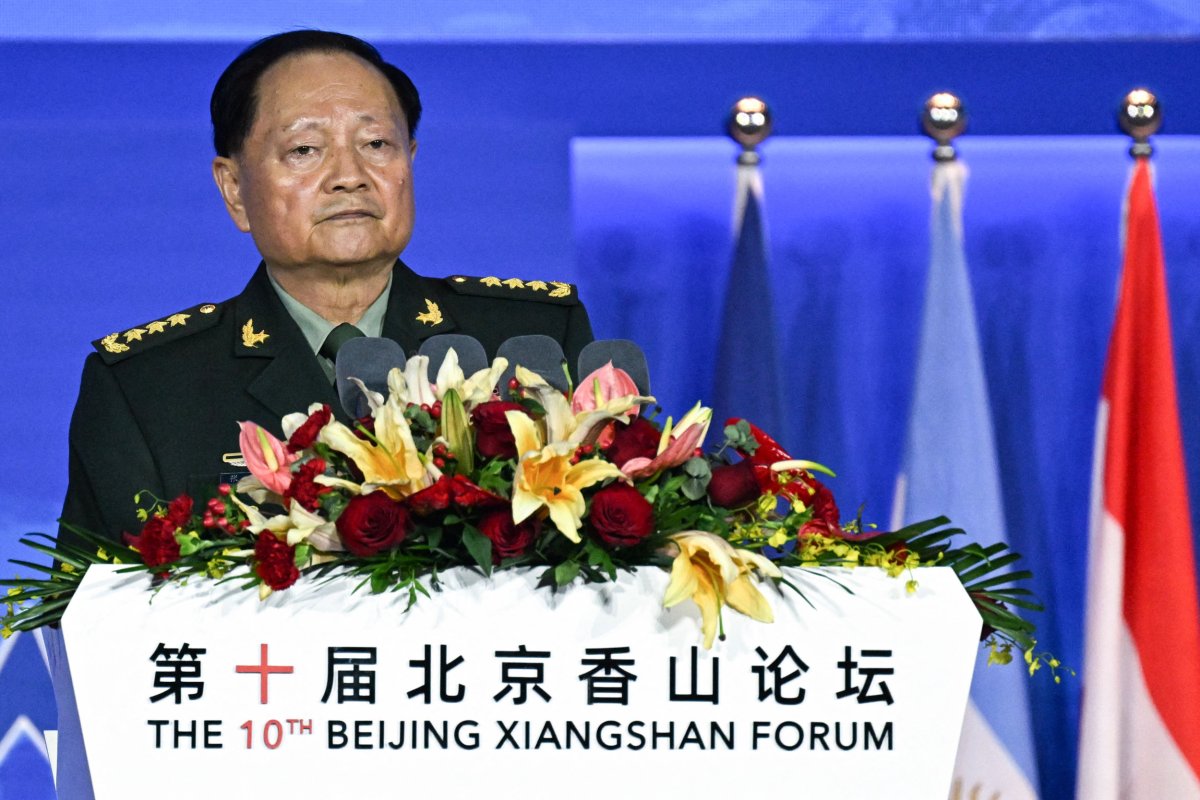China's top general has said the People's Liberation Army (PLA) will "show no mercy" towards those who support Taiwan's independence.
"No matter who wishes to separate Taiwan from China in any way, the Chinese military will never agree to it," said Zhang Youxia, vice chairman of the Central Military Commission (CMC) at the Xiangshan Forum in Beijing on Monday.
Zhang called out the United States at the forum by saying a "certain country" was trying to "provoke proxy wars."
"They pass knives behind their backs and don't hesitate to provoke proxy wars," Zhang said, referring to the U.S. "Wherever its hands extend to, that is where peace and quiet is not possible."
He alleged that the U.S. was the primary factor behind the Russia-Ukraine war and the Israeli-Palestinian conflict.
The Beijing Xiangshan Forum, an annual three-day gathering of top defense officials and diplomats, will be held from October 29 to 31. The forum is where the world gets a glimpse of Beijing's military diplomacy.
Zhang is the third most senior member of the CMC after Vice Chairman Xu Qiliang. Usually, the Chinese defense minister is Beijing's representative at the forum, but former Defense Minister Li Shangfu was removed from the position without explanation and has yet to be replaced.
Zhang's comments instantly trended in China. The search term "Zhang Youxia, vice chairman of the CMC, talks about the Taiwan issue" began trending on the search engine Baidu on Monday.
Beijing has accused Washington of supporting Taiwan's independence by supplying weapons to the self-administered island and developing closer ties, which is viewed as an infringement of the U.S. "one-China policy." The U.S. maintains unofficial contact with Taiwan.
Washington has accused Beijing of carrying out coercive military exercises in the Taiwan Strait and contributing to the escalation of tensions.
A former Chinese diplomat targeted the U.S. more directly at the Xiangshan Forum on Sunday.
Cui Tiankai, the former Chinese ambassador to the U.S., said the nation's strategy of "small yard, high fence" is the same as "sitting in a well and looking at the sky" while taking a swipe at Washington for trying to decouple its economy from Beijing.
The phrase "small yard, high fence" was first articulated by U.S. National Security Advisor Jake Sullivan to explain the Biden administration's strategy to protect Washington's edge in critical technologies.
Under the strategy, Washington has taken the approach of "derisking" its economy from China and the technology supply chain through a series of measures imposed by the U.S. Commerce Department. However, Beijing views Washington's recent actions, such as restricting high-end semiconductor chip supply, as a strategy to hurt the Chinese economy.

Cui said that there was no difference between derisking and decoupling the two economies as Washington was "artificially trying to block usual scientific, technological, and economic exchanges" between the two countries.
He added that Washington and Beijing can't "lie flat" to avoid conflict.
"If we lie flat and do nothing, the least desired thing is likely to happen," he said at the forum on Sunday.
"But this does not mean that we can automatically avoid conflict and confrontation by doing nothing. It requires joint efforts from both sides," he added.
A new report by the International Crisis Group called "Preventing War in the Taiwan Strait" said Beijing's military signaling is part of a strategy to deter "deeper cooperation" between Washington and Taipei.
"Through military signalling, Beijing seeks not only to express its opposition to specific actions taken by Taiwan and the U.S. but also to heighten a sense of risk in order to induce caution on the part of decision-makers in Taipei and Washington, to deter deeper forms of cooperation and additional actions that – from Beijing's point of view – will make unification with Taiwan more challenging," the report said.
It also said that Taiwan has become the stage for both Washington and Beijing to project their "strategic anxieties" and that all these parties, including Taiwan itself, have a different understanding of what the "status quo" will mean in the present context:
"Slowing the escalatory dynamic among the three major parties will, however, require a renewed effort on the part of each to shore up the framework of understandings that has helped to keep conflict at bay."
Uncommon Knowledge
Newsweek is committed to challenging conventional wisdom and finding connections in the search for common ground.
Newsweek is committed to challenging conventional wisdom and finding connections in the search for common ground.
fairness meter
To Rate This Article
About the writer
Aadil Brar is a reporter for Newsweek based in Taipei, Taiwan. He covers international security, U.S.-China relations, and East Asian ... Read more
To read how Newsweek uses AI as a newsroom tool, Click here.








